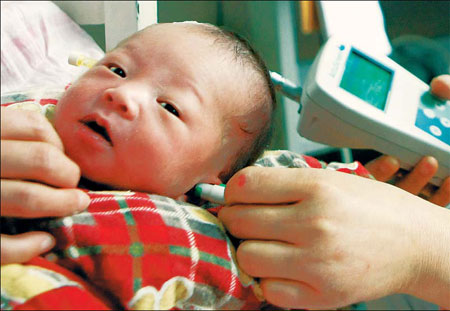|

|
|
A nurse checks a baby's hearing at a hospital in Huaibei, Anhui province, yesterday. Wang Wen [China Daily] |
Wang Bo raises six of his fingers and screams, his face red with frustration at trying to tell the doctor his age during his latest medical checkup.
"It's okay, my son, take it easy you've already improved a lot," the 6-year-old's mother Wang Baolin, 27, said.
The native of Shijiazhuang, Hebei province, told China Daily her son was unable to speak until the age of 4, when he was given a hearing aid implant.
Wang Bo is one of 28 million people in China who have a hearing impairment. The total is growing by 30,000 a year, health reports have said.
The Ministry of Health said Thursday that it will soon introduce a screening program for newborns that will help reduce the incidence of debilitating conditions.
The ailments include congenital hypothyroidism, which impedes infants' growth and brain development; phenylketonuria (PKU), which causes mental disabilities and hearing disorders; and other hearing problems like those suffered by Wang Bo.
The screening procedure will include taking blood samples to check for PKU and congenital hypothyroidism, and conducting a listening test within one hour of every baby's birth, the ministry said on its website.
Screening examination centers will be open to the public across the country before June 1, it said.
According to the National Population and Family Planning Commission, a Chinese baby with some form of physical defect is born every 30 seconds.
Wang Shufeng, director of the Hearing and Speech Rehabilitation Center of the China Disabled Person's Federation, told China Daily: "The fact is that most of these problems can be successfully treated if they are detected soon after birth.
"And if the services are free, more people will benefit," he said.
At present, the screening procedures cost about 100 yuan (US$15), he said.
Since the start of this year, disabled children in Beijing have been given an annual allowance to help pay for medical treatments.
"Things are getting better, but the allowances are far from enough," Wang said.
(China Daily March 6, 2009)